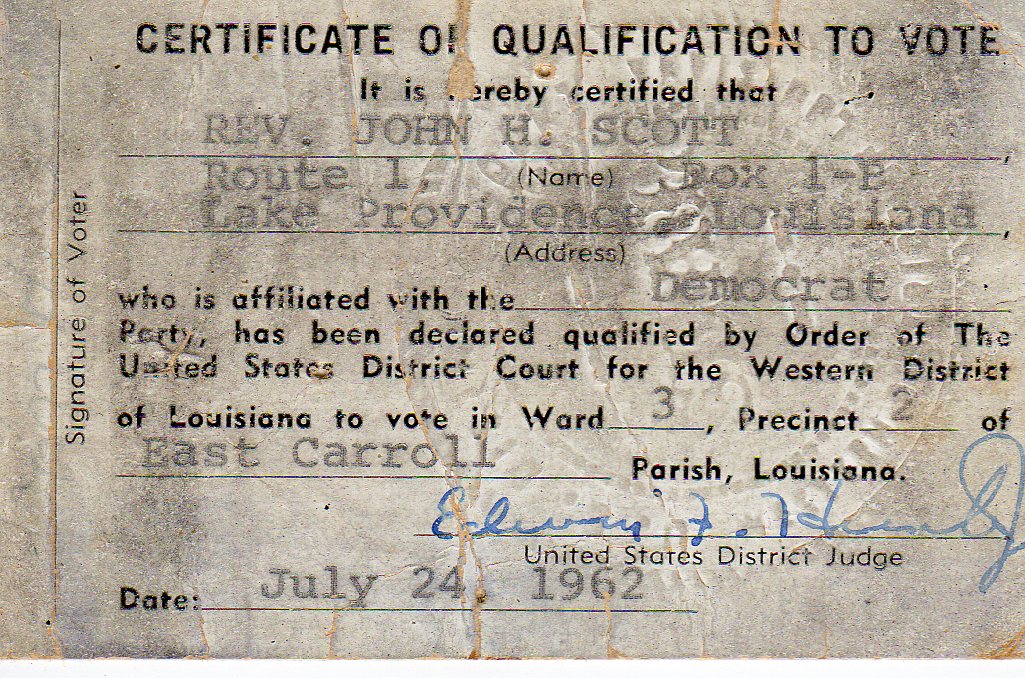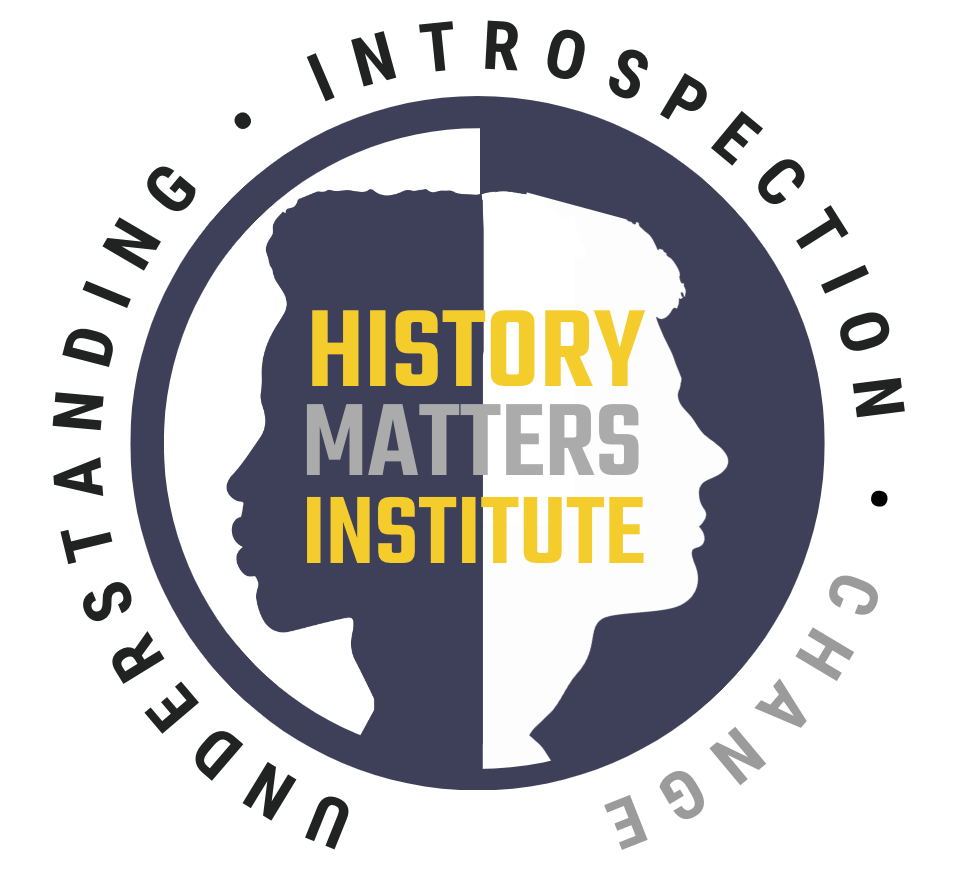Voting Rights, East Carroll Parish (Updated 2/24/2016)
Note: Links to Research Materials at bottom of page
On March 22, 1879 at about 4 p.m. a group of armed white men entered the room in the Lake Providence, LA courthouse where the police jury (city council) was in session. With pistols drawn, the armed men forced the three African American members to sign a statement saying that they resigned their positions because of their incompetency to serve.
From 1879 until 1922, some African Americans in East Carroll Parish were allowed to register but none were allowed to cast their ballots. From the next 40 years, from 1922 to 1962, African Americans could neither register nor vote.
 My father, Rev. John H. Scott, and a small group attempted to register to vote starting in the 1940s. At first they couldn’t even find the location of the registration office and when they found out the location, they still were not allowed to register. After years of trying to register, my father along with two large farmers, Rev. Joseph Atlas and Watson Sanders traveled to New Orleans on September 27, 1960 to testify at the United States Commission on Civil Rights hearings on voting rights violations in Louisiana. My father and Rev. Atlas testified at this hearing.
My father, Rev. John H. Scott, and a small group attempted to register to vote starting in the 1940s. At first they couldn’t even find the location of the registration office and when they found out the location, they still were not allowed to register. After years of trying to register, my father along with two large farmers, Rev. Joseph Atlas and Watson Sanders traveled to New Orleans on September 27, 1960 to testify at the United States Commission on Civil Rights hearings on voting rights violations in Louisiana. My father and Rev. Atlas testified at this hearing.

Rev. Atlas
Following the hearing, local white business owners launched a full scale boycott against Rev. Atlas, refusing to buy his farm products and refusing to sell products of any kind to Rev. Atlas and my father. The story was covered in the April 15, 1965 issue of Jet magazine. My father contacted the Justice Department about these retaliations, and their subsequent investigation was instrumental in my father being able to convince Attorney General Robert Kennedy to file suit against Louisiana and the local registrar of voters.
The case was tried in the United States District court on November 27, 1961. At the time, the white population was 2990, registered to vote 2845 (or 95% of them) and 4183 blacks and 0 registered to vote. East Carroll, Madison, and Tensas were three of only four parishes in the state of Louisiana that had zero registered black voters in 1962. Because the delta parishes of East Carroll, Madison, and Tensas all had majority-black populations, it had become critical to segregationist strategists that African Americans in these parishes would not have access to the ballot.
The courts ruled that the registrar had to start registering black people in East Carroll, but the Registrar simply closed his office and tendered his resignation.
 There was a clause in the 1960s Civil Rights Act (which was subsequently removed after the East Carroll case) that allowed people to apply to be qualified to vote through the Federal courts if a pattern of discrimination had been found and people still were unable to get registered. On July 12, 1962 in Monroe, LA, 28 African Americans were ruled qualified to become registered voters after they had passed an American government test, read the Preamble and wrote it from from dictation, and completed their applications with no errors. The state of Louisiana protested their qualifications and a second hearing two weeks later in Shreveport, LA resulted in the disqualification of three main leaders in the cause, Lehman Griffin Sr., James Levi, and Watson Sanders and the addition of one more applicant. The court finally certified 26 as registered, the first to be registered in East Carroll Parish since 1922 marking the only time a federal court issued a voter registration certification.
There was a clause in the 1960s Civil Rights Act (which was subsequently removed after the East Carroll case) that allowed people to apply to be qualified to vote through the Federal courts if a pattern of discrimination had been found and people still were unable to get registered. On July 12, 1962 in Monroe, LA, 28 African Americans were ruled qualified to become registered voters after they had passed an American government test, read the Preamble and wrote it from from dictation, and completed their applications with no errors. The state of Louisiana protested their qualifications and a second hearing two weeks later in Shreveport, LA resulted in the disqualification of three main leaders in the cause, Lehman Griffin Sr., James Levi, and Watson Sanders and the addition of one more applicant. The court finally certified 26 as registered, the first to be registered in East Carroll Parish since 1922 marking the only time a federal court issued a voter registration certification.
FOR THE FULL STORY OF NORTH EAST LOUISIANA’S FIGHT FOR THE RIGHT TO VOTE, SEE “WITNESS TO THE TRUTH” PUBLISHED BY THE UNIVERSITY OF SOUTH CAROLINA PRESS. INFORMATION AND PURCHASE INFO HERE
A SAMPLE OF VOTING RIGHTS DOCUMENTS IN THE SCOTT COLLECTION:
1962, Feb 12, Brief in Support of Plaintiff’s Proposed Findings of Fact: This document provides 27 pages of detailed background information on the registration and voting conditions up to the time of the Federal court hearing in 1962.
1962, June Cover letter from Attorney Dunbaugh sent to my father with the May 30th Findings of Fact document
1962, May 30, Findings of Fact: 10 page document outlining the basis for the finding of discrimination in voting in East Carroll Parish
1962, June 14, Letter of Resignation by Registrar of Voters.
1962, July 9 Invitation to Register in Federal Court: After winning the right to vote in court, African Americans still were not allowed to register due to the resignation of the Registrar of Voters. They applied to register via Federal court under a provision of the Civil Rights Act. This letter is an acknowledgement of my father’s application to appear in Federal Court to have a hearing on his qualifications to vote.
1962, July 12th Court Order: Ruling on the 76 applicants who asked for a hearing in federal court on their qualifications to register to vote; includes list of all who applied and all who qualified to register at the first hearing. 6 pgs
Citizenship Test Administered by the Courts: My father and the applicants who appeared in federal court were required to take this citizenship test as a part of the voter qualification process.
1962, July 25, Findings of Facts Relating to Objections to July 12th Ruling
1962, August 6, Court Order. Findings on objections to the 28 people ruled as qualified in the July 12th Court Order.
1962, August 7, Editorial Monroe Morning World, “East Carroll Voter Case”
1962, August 22, Order, Registrar Contempt of Court Hearing: Charges were filed against the Registrar of Voters for leaving his office with no one available to register the people after the courts had ordered him to allow African Americans to register to vote
1962, August 22, “Manning Resumes Office”, Monroe Morning World article.
1962, August 22, My father shot after returning from the Registrar Contempt hearing. Related article Louisiana Weekly, Sept. 29th

